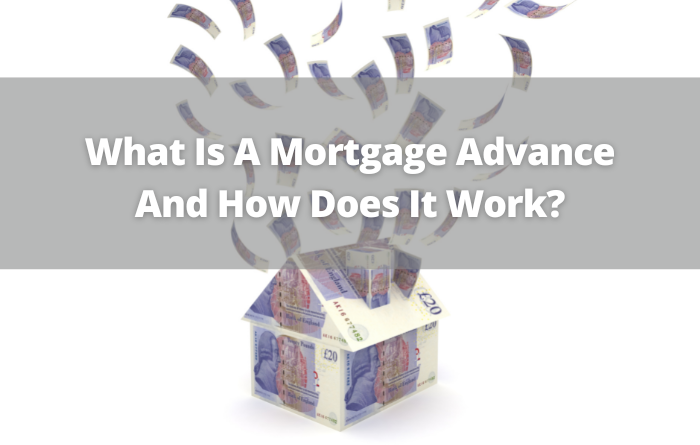What Is A Mortgage Advance And How Does It Work?
If you’ve ever wondered what is a mortgage advance? Read on for everything you need to know. A mortgage advance is a service from a mortgage lender that allows homeowners to access a loan from the value of equity in their home. In most cases, a mortgage advance can be used to borrow money for any purpose, including home improvement projects, debt consolidation, or major purchases, but to qualify for a mortgage advance, borrowers need to have equity in their home and good credit history.
When you’re buying a house, there are a lot of different terms that you may not be familiar with. One of those is a mortgage advance. You may have heard of it – but what is it? How does it work? And how can you make sure you get the most out of it? Here is the simple overview you need.
Overview Of A Mortgage Advance
A mortgage advance is a process of borrowing borrow money against the property value of your home. You can do this by borrowing back the equity you have built up by paying your mortgage off, or your property increasing in value. The amount of money that you can borrow from a mortgage lender, and the interest rate charged, will depend on the equity available, your financial circumstances, and your credit history.
Mortgage advances are typically only available to borrowers who already own a large portion of their home, have already paid off a significant portion of their mortgage, or paid their mortgage early if one exists. They typically come with higher interest rates than traditional mortgages but they can be a good option for borrowers who need quick access to cash and don’t want to go through the process of applying for a new loan.
You can use a mortgage advance for any purpose, such as making home improvements, paying off debts, or buying a new car, but to get a mortgage advance, you will usually need to have equity in your home.
Can Any Lender Give Me A Mortgage Advance?
UK law requires that any lender who offers a mortgage advance must be authorised and regulated by the Financial Conduct Authority (FCA). As such, just any lender can’t provide a mortgage advance.
In most cases, you can usually only get a mortgage advance from your current mortgage lender but there may be some exceptions to this rule, so it’s always worth checking with your lender or a mortgage broker to see what options you have available when looking to release extra cash from your home.
For example, if you have passed any initial fixed-rate period on your mortgage, and can port (move mortgage providers), then you may be able to shop around and remortgage with a more competitive lender at the same time that you apply for the advance.
Will I Pay Interest?
Yes, when taking a mortgage advance, you will pay interest on the amount borrowed at an agreed interest rate. The amount paid will depend on the financial marketplace, the Bank of England base rate, the amount borrowed in relation to the value of your home and the length of time that you want to pay the loan back over. You should use financial comparison websites to get an idea of the rates available.
The interest rate on a mortgage advance is usually higher than the interest rate on your main mortgage amount loan as it’s considered to be a higher risk to the lender. As with your mortgage, fixed interest periods are possible, but if you default on the advance loan, the lender could repossess your home. If you keep up with your repayments, a mortgage advance can be an affordable way to access extra funds.
How To Repay
You can usually choose to make interest-only repayments on further advances, which will lower your monthly repayments but mean that you don’t start paying off the debt itself until the end of the term. Alternatively, you could make repayment mortgage payments, which will clear the debt more quickly but cost more each month.
The repayment term for a mortgage advance is usually shorter than the remaining term of your mortgage. For example, if you have 20 years left on your mortgage, you may only be able to take out a 10-year mortgage advance. This means that you will need to make higher monthly repayments to clear the debt within the shorter time frame.
How To Apply
The process of applying for a mortgage advance can vary depending on your lender, but in most cases, you can apply by contacting your lender and filling out an application form, just like you would when taking out a mortgage deal. You can also choose to approach a new lender too, and in both cases, the application will ask for your financial information, including your income, debts, and assets. Your lender will also need to know the current value of your home and how much equity you have in it.
Most lenders will arrange to carry out a property valuation as part of the mortgage advance application process. This may require a physical appointment to visit the property, or it may be possible to do a desktop valuation where the bank can value your home from the information available online. As the value of the property is directly linked to the amount the lender will be willing to lend you, and the risk of them doing so, this is an important step in the process. Lenders will advertise their loan-to-value ratio and most lenders will be willing to lend up to 85% of the value of your home, assuming that you meet their eligibility criteria, credit rating assessment, and affordability tests.
Once you have submitted your application, the lender will review all the information and affordability calculations to determine whether or not you are a reliable borrower and are eligible for a mortgage advance over an agreed mortgage term. If you are approved, you will be able to access the funds you need in a matter of days.
What Fees Are Involved?

When you take out a mortgage advance, you’ll usually have to pay an upfront fee to cover the cost of the loan plus additional fees that will be due over the mortgage term if you miss payments or settle your mortgage account early. All fees will vary between lenders, so you should make sure to check the fine print and take regulated mortgage advice before signing an agreement.
Fees to be aware of:
- there’s the mortgage application fee, which covers the cost of processing your application.
- the valuation fee, which is charged by the lender to assess your property.
- the arrangement fee, which is paid to cover the cost of setting up your mortgage.
- the monthly payments and interest payments
- early repayment charges if you settle your account before the agreed repayment term
- missed payment fees
The fees payable will vary between lenders and may not all apply if special deals or exemptions are available. With this in mind, it’s worth shopping around and talking to a mortgage broker to compare deals before you apply.
What Is Equity?
It’s clear that equity is important when it comes to getting a mortgage advance, so what is it and how do you increase the equity that you have in your home?
Equity is the portion of your property’s value that you own outright, minus any outstanding mortgage debt. For example, if your home is worth £200,000 and you have a £100,000 mortgage outstanding, you have £100,000 equity in your property because this is the amount of the property’s value that you already own.
When you apply for a mortgage advance, the lender will assess the equity in your property and offer you a loan based on a percentage of this amount. In most cases, you can borrow up to 85% of your property’s value as a mortgage advance.
How To Build Equity?

To build equity, you can increase the proportion of the property that you own or increase the value of the property.
The most straightforward method to build equity in your home is to simply make any mortgage payments owed on time and as scheduled. Each payment that you make will help you to gradually increase your ownership stake in your property and therefore increase the equity that you have.
The second way to equity is to make upgrades and improvements to your home that increase its value or for the value of the property to increase through housing market conditions. For example, adding an extra bedroom or bathroom, renovating the kitchen or living room, and keeping your property well-maintained and in good repair will also help to boost its value, as can a boom in house prices in your area.
Home Value And Equity
The value of your home is the amount of money a buyer would be willing to pay for your property. This figure is based on several factors including; location, condition of the property, the features that it boasts, and current house market conditions such as the number of buyers compared to the number of homes available for sale.
Home equity is the difference between the value of your property and the amount you still owe on any mortgage or loan used to purchase the property. If you have purchased your home outright or already paid off any mortgage that you took out to buy the property, then your total home equity equals the current value of your home.
For example, let’s say your home is worth £200,000 and you owe £150,000 on your mortgage. Your home equity would be £50,000. If however your home was worth £200,000 and you have no outstanding mortgage debt to repay, then your home equity would be £200,000.
Home equity can increase if the value of your property goes up or if you pay down your mortgage. You can use your home equity to finance home improvements, consolidate debt, or get a home equity loan or line of credit. Just be aware that if you take out a home equity loan or line of credit, you’re putting your home at risk if you can’t make the payments.
Is a This Right for Me?
Ultimately deciding whether a mortgage advance is right for you will depend on your individual circumstances including your attitude to more borrowing, how urgently you need the funds, and whether you can afford additional borrowing on top of other debt repayments. There is no one size fits all answer when it comes to the suitability of getting a mortgage advance.
A mortgage advance can be a good way to access extra funds from an existing lender or new lender if you have equity in your property and good credit history but as it’s a form of secured borrowing, you must be able to make the repayments or you face the consequences of the lender repossessing your home if you default on the loan.
An advance can make sense if you need to raise funds and;
- your lender’s further advance is competitive
- you don’t want to remortgage or switch lenders.
- you can spread your payment over the long term and your interest rate should be lower than a personal loan.
- you can afford to make the additional monthly repayment
- your existing debt repayments and living costs are manageable when taking on additional borrowing
Before taking out a mortgage advance, make sure that you understand the risks and compare your existing lender with the rest of the market. This will help you to find the best deal for you as this kind of secure loan is typically offered at a different rate than your main mortgage.
How Can Your Advance Be Spent?

As a mortgage holder, the money from a mortgage advance can be used for anything you want, but it’s usually used to help pay for home improvements, repairs, or other large expenses that may be unexpected such as medical bills or debt consolidation. Mortgage advances can be a great way to get the money you need without having to take out a separate personal loan, which often attracts higher interest rates and can form a key part of your financial planning.
Common reasons to take out a mortgage advance
- Home improvements
- School fees
- Raising funds for family needs
- Divorce settlement
- Debt consolidation
- Car purchase
- Buying a second property
- Better interest rates than personal loans
Summary
So there you have it, this article aims to help anyone looking to understand ‘what is a mortgage advance and how it works.
To recap, a mortgage advance is a form of secured borrowing that entails taking out additional money against your property and you must be able to afford the repayments. The amount you can borrow will depend on the equity you have in your home as well as your lender’s affordability criteria. Taking out a mortgage advance can help you access extra funds for home improvements or other large expenses, but it’s important to understand the risks involved before taking out this type of loan because if you don’t keep up your additional monthly payments your home may be repossessed.
If you’re thinking of taking out a mortgage advance, make sure you do your research with free resources such as the money advice service, and compare different lenders to get the best deal.
This article is for general information only and is not intended to be advice for your specific situation. You should always seek professional advice from a regulated mortgage broker or financial advisor when taking out any kind of property finance.

